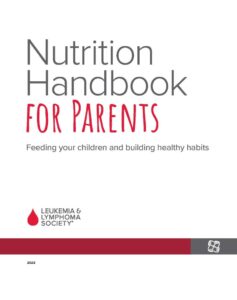The Dietary Guidelines for Americans recommends for all people age 2 and older to include the following foods in their menus:
- Variety of vegetables and fruits
- Whole grains
- Fat-free and low-fat dairy products
- Variety of protein foods, including plant proteins
- Oils
The guidelines also recommend to limit saturated and trans fat, added sugars, and sodium.
Specific calorie needs for children depend on age, sex, and health. The Mayo Clinic provides general suggestions for calories and servings based on age and sex.
Infants and toddlers have different nutrition needs as well. Visit The Centers for Disease Control and Prevention (CDC)’s Infant and Toddler Nutrition webpage to learn more.
A child in cancer treatment may need additional calories or protein. A child in cancer treatment may experience side effects that make eating difficult. Work with your child’s healthcare team to modify nutrition strategies as needed. See During Treatment for more information.
For specific recommendations for your child’s nutritional needs, talk to your child’s pediatrician and ask for a referral to a registered dietitian with expertise in pediatric oncology nutrition.
Vitamins and Supplements
Food is the best source for the vitamins and nutrients your child needs. However, during cancer treatment your child may have difficulty getting enough calcium and vitamin D, both of which are important to build strong bones. Ask your child’s doctor or a registered dietitian if your child needs a multivitamin or some other supplement. Do not give your child any vitamins or supplements without consulting your child’s healthcare team first. Some vitamins and supplements can interfere with cancer treatment.

